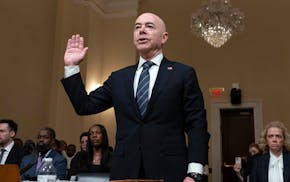WASHINGTON - In the first major policy address of his presidential campaign, former Minnesota Gov. Tim Pawlenty on Tuesday proposed dramatic tax and spending cuts that would end the federal government's role in delivering mail, running trains and backing home mortgages.
Speaking at the University of Chicago business school, Pawlenty delivered a sweeping plan for shrinking government as defined in what he called "the Google test."
"If you can find a good or service on the Internet, then the federal government probably doesn't need to be doing it," he said. "The post office, the government printing office, Amtrak, Fannie and Freddie, were all built for a time in our country when the private sector did not adequately provide those products. "That's no longer the case." (Fannie Mae and Freddie Mac are quasi-federal institutions developed to promote home ownership.)
As Pawlenty seeks the Republican presidential nomination in 2012, he is doubling down on his credentials as a fiscal conservative. His plan would cut the corporate tax rate by more than half, from 35 percent to 15 percent. Individual rates would be whittled to two tiers: 10 percent on income up to $50,000 ($100,000 for married couples), and 25 percent for "everything above that."
Presented as a pro-business prescription for economic growth and job creation, Pawlenty's 30-minute speech outlined government reforms that would sunset all federal regulations unless specifically renewed by Congress, as well as grant the president emergency powers to freeze federal spending.
Pawlenty suggested impounding as much as 5 percent of federal spending until the budget is balanced. Echoing an idea that has been circulating among GOP lawmakers, Pawlenty said that cutting 1 percent of overall federal spending for six consecutive years would balance the federal budget by 2017.
Pawlenty also took sharp aim at President Obama's economic record, which has taken a beating in recent polls.
"How are you enjoying your recovery summer?" Pawlenty said. "That's what the president said we were having. And that was last year. ... If that was a recovery, then our president needs to enter economic rehab. And the American people need to stop his policies. Cold turkey."
Democrats fire back
Democrats and their allies shot back with a number of scathing critiques that highlighted the $5 billion projected deficit and property tax increases Pawlenty left behind in Minnesota.
"If you want to see what Tim Pawlenty's reckless economic policies will do to the country, look no further than what he did to Minnesota," said state DFL Chairman Ken Martin.
Pawlenty said that pro-growth tax and regulatory reform could rev up the national economy to perform better than the current "anemic" growth rate of less than 2 percent. He called for setting a "positive goal" of 5 percent. He would also end taxes on capital gains, interest, dividends and inheritances.
Pawlenty's far-reaching economic prescriptions, tailored for the fiscal conservatives who dominate the GOP endorsement process, relied heavily on his record as a two-term governor.
"I know government can cut spending," he said, "because I did it in Minnesota."
Pawlenty, as he often does, noted that he cut spending in real terms in the state for the first time in its history, incurring a government shutdown at one point. "We didn't close our schools, or empty out our prisons," he said.
He did not, Democrats pointed out, mention the infusion of federal stimulus spending and massive borrowing from K-12 school funds that helped balance state budgets or the cigarette fee that ended the 2005 government shutdown.
Democrats, as well as some students in the audience, questioned how Pawlenty would reduce the nation's $1.6 trillion federal deficit, given the potential drop in revenues from his tax cuts.
"No one should be surprised that a failed former governor who left his state with a massive projected budget deficit in the billions of dollars is now proposing to massively explode the deficit at the federal level," said Debbie Wasserman Schultz, chairwoman of the Democratic National Committee (DNC).
The DNC cited a Tax Policy Center study showing that that more modest tax cuts proposed by U.S. House Republicans would cost $2.9 trillion over 10 years.
As part of his economic program, Pawlenty renewed his calls for a balanced budget amendment, as well as for caps on spending as a percentage of the economy. He suggested the historical average of 18 percent of gross domestic product, down from 25 percent this year.
He also proposed capping and "block-granting" Medicaid to the states. As he has before, he endorsed raising the Social Security retirement age, although he did not say by how much.
Taking on another major category of built-in government spending, Pawlenty said he would slow the rate of growth in defense spending.
Pawlenty avoided mention of the controversy over U.S. Rep. Paul Ryan's plan to turn Medicare into a voucher program for future generations. Instead, he said he will unveil his own plan "in the next couple of months, or less."
Kevin Diaz is a correspondent in the Star Tribune Washington Bureau.
New Black congressional district in Louisiana bows to politics, not race, backers say
Trump trial jury selection process follows a familiar pattern with an unpredictable outcome
Climate change concerns grow, but few think Biden's climate law will help, AP-NORC poll finds
